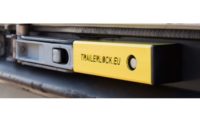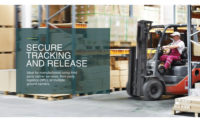As today's global supply chain grows more complex, so too does the ability to secure it. One of the biggest challenges affecting businesses is cargo theft, and the resulting potential disruption of the supply chain.
An effective security program must be well planned and combine technology with robust security procedures and fundamental security practices. Here are 10 steps food processors and others should follow.
1. Be alert.Be aware of possible surveillance being conducted on your facility's operation. Suspicious activities will include:
- Vehicles parked outside your facility or within view of the facility gates and entrances.
- Individuals with cameras (still or video) or taking notes outside your facility.
- Unauthorized personnel inside the facility, on the grounds, or walking the perimeter.
- Vehicles (usually mini-vans or SUVs), especially those with two or more occupants, that appear to be following your drivers. It is not uncommon for cargo theft teams to follow their target for hundreds of miles waiting for an opportunity to hijack the vehicle and cargo.
2. Report.Immediately report all suspicious activity and/or theft to management and law enforcement officials. Criminals can move stolen goods quickly, so immediate reporting of theft to law enforcement is critical.
3. Respond to every alarm.Frequent "false alarms," including attempted entries or break-ins into the facility, may be a sign that suspicious individuals are testing the facility security system and response times for law enforcement.
4. Manage information.Do not share information on cargo or operations with anyone except those involved in the operation. You also should:
- Limit load information within the facility to parties who have a need to know the information.
- Maintain inventory control. Unusual changes in inventory levels may help to alert when something is awry.
5. Know your supply chain.Know the carrier and driver that are scheduled to pick-up your cargo and verify their identity before a load is released. You also should:
- Monitor delivery schedules and routes, treat suspiciously any over due shipments or out of route journeys.
- Review the security of your supply chain partners and know where your cargo will stop along its route. Will it go directly to the delivery point or will the cargo be consolidated with other cargo or sit temporarily in another yard?
6. Execute basic safety practices.Keep trucks locked and park them in an organized manner on a well-lit facility lot. You also should:
- Ensure alarm systems are functioning properly, and monitored by a central station that has updated contact information.
- Ensure your central station is capable of detecting telephone line interruptions. (This is done with a DVAC line or cellular backup.)
- Communicate to driver teams that one person must remain with the vehicle at all times. Review security at your site regularly and quickly address maintenance and repair items.
7. Tap into technology:Advances in technology, such as GPS tracking, have improved a fleet manager's ability to monitor vehicles. Onboard telematics technology significantly improves the vehicle recovery process and may deter a less sophisticated criminal.
8. Screen employees.Often cargo theft is perpetrated with inside help. Rigorous pre-employment screening will help weed out those most likely to steal merchandise from a warehouse, loading dock, or truck.
9. Train employees.Make your drivers effective with good security training. You can do this by:
- Communicating security awareness information and location-specific security rules to employees and carriers.
- Providing security training covering basic topics such as their role in the security system, how to report security incidents, and how to recognize internal conspiracies and suspicious activities
- Participating in the Highway Watch program to train drivers to look for suspicious and possibly terrorism related activities
10. Be involved.There are several organizations that can help you combat cargo theft. These include:
- International Cargo Security Council (http://www.cargosecurity.com/ncsc/) and your Local Cargo Security Council
- American Society for Industrial Security (www.asisonline.org)
- Customs-Trade Partnership Against Terrorism (C-TPAT) (http://www.customs.gov/xp/cgov/import/commercial_enforcement/ctpat/)
- Technology Asset Protection Association (TAPA) (www.tapaonline.org)
- Cargo theft task forces (http://www.cargosecurity.com/ncsc/images/Cargo_Security_Councils.pdf)
Bill Anderson is director of global security for Ryder System, Inc., Miami, Fla.


